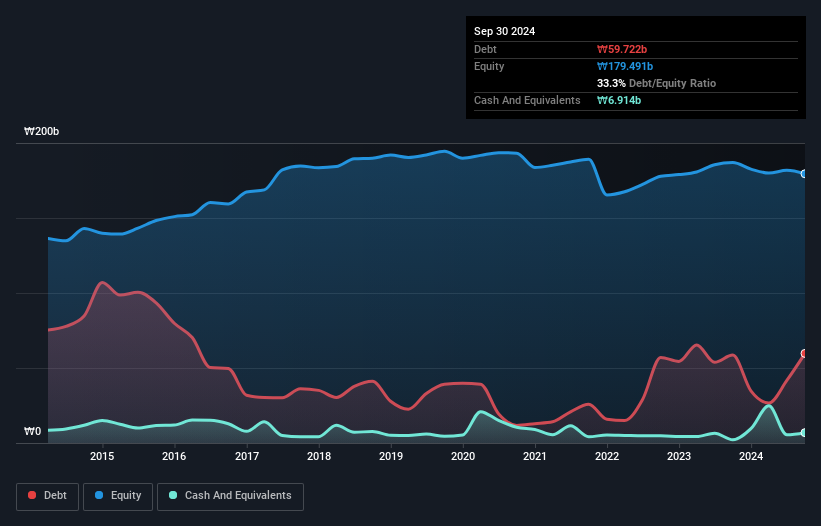- South Korea
- /
- Machinery
- /
- KOSDAQ:A041440
We Think Hyundai Everdigm (KOSDAQ:041440) Has A Fair Chunk Of Debt

Some say volatility, rather than debt, is the best way to think about risk as an investor, but Warren Buffett famously said that 'Volatility is far from synonymous with risk.' So it seems the smart money knows that debt - which is usually involved in bankruptcies - is a very important factor, when you assess how risky a company is. We can see that Hyundai Everdigm Corp. (KOSDAQ:041440) does use debt in its business. But the more important question is: how much risk is that debt creating?
When Is Debt A Problem?
Debt and other liabilities become risky for a business when it cannot easily fulfill those obligations, either with free cash flow or by raising capital at an attractive price. Part and parcel of capitalism is the process of 'creative destruction' where failed businesses are mercilessly liquidated by their bankers. While that is not too common, we often do see indebted companies permanently diluting shareholders because lenders force them to raise capital at a distressed price. Of course, plenty of companies use debt to fund growth, without any negative consequences. When we think about a company's use of debt, we first look at cash and debt together.
See our latest analysis for Hyundai Everdigm
What Is Hyundai Everdigm's Debt?
The chart below, which you can click on for greater detail, shows that Hyundai Everdigm had ₩59.7b in debt in September 2024; about the same as the year before. On the flip side, it has ₩6.91b in cash leading to net debt of about ₩52.8b.

How Healthy Is Hyundai Everdigm's Balance Sheet?
According to the last reported balance sheet, Hyundai Everdigm had liabilities of ₩178.4b due within 12 months, and liabilities of ₩4.62b due beyond 12 months. On the other hand, it had cash of ₩6.91b and ₩62.5b worth of receivables due within a year. So its liabilities outweigh the sum of its cash and (near-term) receivables by ₩113.6b.
This deficit is considerable relative to its market capitalization of ₩169.0b, so it does suggest shareholders should keep an eye on Hyundai Everdigm's use of debt. This suggests shareholders would be heavily diluted if the company needed to shore up its balance sheet in a hurry. When analysing debt levels, the balance sheet is the obvious place to start. But it is Hyundai Everdigm's earnings that will influence how the balance sheet holds up in the future. So when considering debt, it's definitely worth looking at the earnings trend. Click here for an interactive snapshot.
Over 12 months, Hyundai Everdigm made a loss at the EBIT level, and saw its revenue drop to ₩289b, which is a fall of 23%. That makes us nervous, to say the least.
Caveat Emptor
Not only did Hyundai Everdigm's revenue slip over the last twelve months, but it also produced negative earnings before interest and tax (EBIT). Indeed, it lost ₩1.6b at the EBIT level. Considering that alongside the liabilities mentioned above does not give us much confidence that company should be using so much debt. Quite frankly we think the balance sheet is far from match-fit, although it could be improved with time. We would feel better if it turned its trailing twelve month loss of ₩4.8b into a profit. So to be blunt we do think it is risky. When analysing debt levels, the balance sheet is the obvious place to start. However, not all investment risk resides within the balance sheet - far from it. We've identified 1 warning sign with Hyundai Everdigm , and understanding them should be part of your investment process.
Of course, if you're the type of investor who prefers buying stocks without the burden of debt, then don't hesitate to discover our exclusive list of net cash growth stocks, today.
If you're looking to trade Hyundai Everdigm, open an account with the lowest-cost platform trusted by professionals, Interactive Brokers.
With clients in over 200 countries and territories, and access to 160 markets, IBKR lets you trade stocks, options, futures, forex, bonds and funds from a single integrated account.
Enjoy no hidden fees, no account minimums, and FX conversion rates as low as 0.03%, far better than what most brokers offer.
Sponsored ContentValuation is complex, but we're here to simplify it.
Discover if Hyundai Everdigm might be undervalued or overvalued with our detailed analysis, featuring fair value estimates, potential risks, dividends, insider trades, and its financial condition.
Access Free AnalysisHave feedback on this article? Concerned about the content? Get in touch with us directly. Alternatively, email editorial-team (at) simplywallst.com.
This article by Simply Wall St is general in nature. We provide commentary based on historical data and analyst forecasts only using an unbiased methodology and our articles are not intended to be financial advice. It does not constitute a recommendation to buy or sell any stock, and does not take account of your objectives, or your financial situation. We aim to bring you long-term focused analysis driven by fundamental data. Note that our analysis may not factor in the latest price-sensitive company announcements or qualitative material. Simply Wall St has no position in any stocks mentioned.
About KOSDAQ:A041440
Hyundai Everdigm
Produces and sells construction and mining equipment, and rescue products in South Korea and internationally.
Adequate balance sheet with acceptable track record.
Similar Companies
Market Insights
Community Narratives



